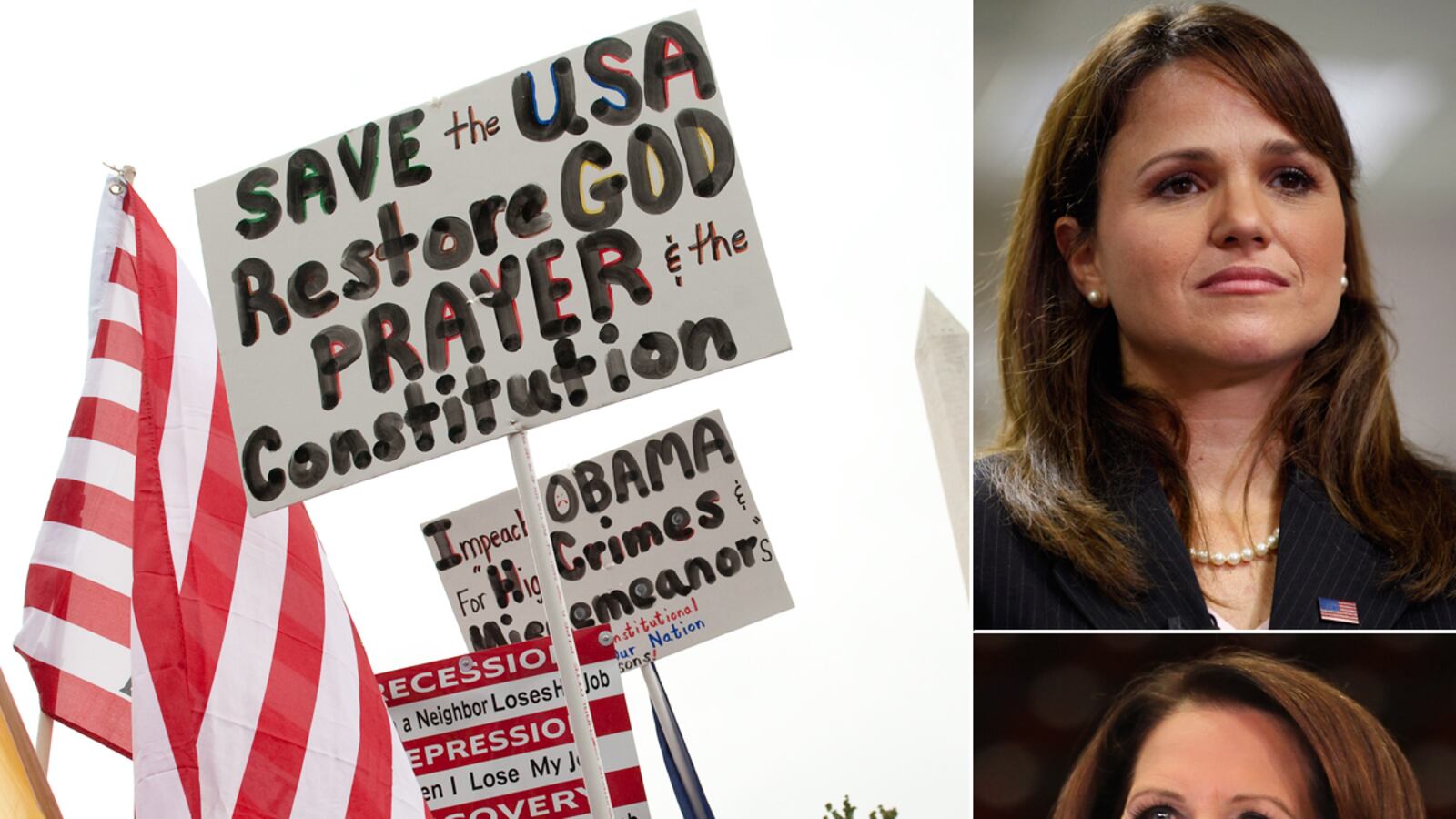On Wednesday night, former Tea Party candidate Christine O’Donnell walked off the set of Piers Morgan Tonight after refusing to answer a question about gay marriage. She said she hadn’t come on the show to deal with “a rude talk- show host, but to talk about my book and talk about the issues I address in my book.” Meanwhile, Michele Bachmann, once an outspoken social conservative, has reduced her comments on gay marriage to vague statements like “I’m not judging anyone” and “I think my views are clear.”
Tea Party candidates like O’Donnell and Bachmann have campaigned on libertarian economic platforms, leading some commentators to dig into old Ayn Rand novels for the source of this new economic populism. But what they’ve missed is that the Tea Party’s obsession with the size of government has been part of Christian conservatives’ platform for decades. The Tea Party was just a new name coined by clever activists and the media—a rebranding that has made it much easier for Christian-right candidates to run for office without having to air their views on social issues, which are increasingly viewed in a negative light by the general public.
The extent of the rebranding was confirmed this week by a new survey by David Campbell and Robert Putnam, the authors of last year’s monumental American Grace. Polling 3,000 people before and after the rise of the Tea Party, Campbell and Putnam identified the two characteristics most likely to turn someone into a Tea Partier: being strongly active in Republican politics and identifying with the religious right. A similar Pew study in February found that 69 percent of white evangelicals agree with the Tea Party.

Campbell and Putnam also found that the Tea Party is one of the most disliked groups in America, with negative ratings somewhere close to those of the religious right—also one of the country’s most unpopular demographics. That’s a significant change from 2006, when Pew found that most Americans had a positive view of the Christian right. Possibly because they are increasingly seen as anti-gay, evangelical conservatives seem to have tanked in the court of public opinion. As Campbell and Putnam put it, even as American voters have shifted to the right, they “have swung even further in opposition to mingling religion and politics.” That may explain why O’Donnell would rather walk off a live TV show than talk about gay marriage.
These Christian conservatives’ unwillingness to discuss their social conservatism is in stark contrast to the 2004 presidential election, when George W. Bush’s team successfully used gay marriage as a wedge issue. In last year’s midterm elections, an overwhelming number of Tea Party challengers had deep ties to the religious right, but had scrubbed their campaign websites of anything but vague references to opposing abortion and, even more rare, to supporting “traditional marriage.”
Whether intentional or not, the almost universal overlap of the Christian right with the Tea Party somehow largely avoided media scrutiny. But after the midterm elections, it was immediately clear where the passion had come from: newcomers to the 112th Congress came overwhelmingly from conservative religious denominations. Suddenly populated with all manner of home-schooling activists, youth ministers, abstinence proponents, former members of radical anti-abortion groups, and even a Mennonite, the current House of Representatives is one of the most religiously conservative in recent history.
It was also apparent in state legislatures, which saw an influx of Tea Party candidates. Nineteen legislative chambers and more than 500 seats changed from Democrat to Republican last year. Almost immediately, they introduced a massive wave of socially conservative legislation: more than 80 anti-abortion laws have been proposed in state legislatures this year, along with a smaller but equally unprecedented blitz of measures aimed at getting creationism into public schools.
But during the campaign, few of these candidates spoke openly about social issues. It’s difficult to know if this was deliberate subterfuge or just a response to the political winds. Rep. James Lankford, an Oklahoma youth minister who won his first campaign in 2010, said he “didn’t talk a lot about spiritual issues” during the campaign because he saw it as a “secular task.”
It should not have been a surprise that Tea Partiers were so synonymous with the religious right. Above all, Christian conservatives are strongly motivated to oppose “statism” or anything that represents the expansion of government power. They see government as a secularizing force that at best has no respect for religious values and at worst is actively working to eradicate them. Taxes and expansive federal programs like Obamacare orient the federal government toward collectivism and, they fear, increased hostility to their beliefs. It makes sense that they would be the leaders of a movement against government encroachment on “liberty,” and would be the kind of intense crusaders Tea Partiers have grabbed headlines for being.






